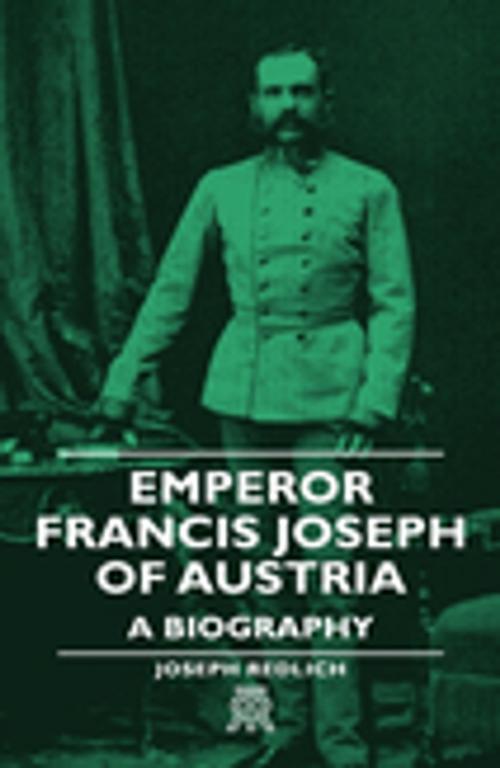| Author: | Joseph Redlich | ISBN: | 9781447496533 |
| Publisher: | Read Books Ltd. | Publication: | April 16, 2013 |
| Imprint: | Cope Press | Language: | English |
| Author: | Joseph Redlich |
| ISBN: | 9781447496533 |
| Publisher: | Read Books Ltd. |
| Publication: | April 16, 2013 |
| Imprint: | Cope Press |
| Language: | English |
EMPEROR FRANCIS JOSEPH OF AUSTRIA Biography by JOSEPH REDLICH. Originally published in 1929. INTRODUCTION: THE life of Emperor Francis Joseph can only be understood in close connection with the political transformation of Europe and the progressive shift in world power that went on during the century between the Congress of Vienna and the Treaty of Versailles. It is from that standpoint that it is here written. At the same time the specific content of this description is his human and political personality. On no other terms can any bounds be set or any form given to the vast mass of interconnected historical events covered by the period of Francis Josephs life and reign. Since, however, whether as man or ruler, he falls far short of being an embodiment of human greatness, it is in a somewhat limited sense only that he fills the conception of a historic personality. So comprehensive, on the other hand, is the range of countries and peoples over whom he reigned j so extensive is the period of his governance j so mighty and multifarious are the European issues influenced, and deeply influenced, by his action and his character, that, judged by the test of influence on great events, he must be said to have counted for more than any other European monarch of the nineteenth century. Compared with his, the singular and momentous career of Napoleon III is but an entracte in Europe. Guardian of an ancient line, inheritor and defender of rights that date far back into medieval times, natural foe of the modern struggle to transform Europe into a series of closed national states, Francis Joseph assumed and maintained for sixty years a position in the Europe that the war destroyed to which that of no other sovereign affords an analogue. What makes him all the more impressive is that there was in him, as in no other European monarch of the past century, a perfect correspondence between the man and his work. To Francis Joseph and to the Empire that came to an end in 1918 the saying certainly applies which is the veritable title deed of biographical history History is made by men. Even in a period preoccupied as is our own with research into the development and function of ideas and of institutions, economic, social and political, history cannot omit personality, since it is the instrument through which the will of a nation or a state has to be exercised. Least of all can this be done where, as with Francis Joseph, the idea of the ruler overpowers that of the man and makes his personal individuality its servant. This is the special note of the problem in biography here attempted. Its peculiarity lies in the sharpened contrast with which we have here to deal, between the limited mental and spiritual powers of the individual in his individual life, and unexampled pressure upon it of political and national, social and economic, ideas and tendencies in all their national and international complexity and all their permutations and combinations, affecting as they did, now this way, now that, the equilibrium of forces in Europe, The extent and difficulty o the task which fell to Francis Joseph in his early youth lends an interest and a special color to his purely personal story. Here the dominant note is given by the fact that, throughout nearly seventy-seven years of action and suffering, Francis Joseph maintained, unaltered, the position he took up on entering on his inheritance. The whole weight of the problems, internal and external, of his realm rested on him he stood firm. This is his distinguishing mark. Constitutional forms might and did alter, but the Emperor retained to the end his primitive conception of the ruler whose will is always the strongest political force in his realm...
EMPEROR FRANCIS JOSEPH OF AUSTRIA Biography by JOSEPH REDLICH. Originally published in 1929. INTRODUCTION: THE life of Emperor Francis Joseph can only be understood in close connection with the political transformation of Europe and the progressive shift in world power that went on during the century between the Congress of Vienna and the Treaty of Versailles. It is from that standpoint that it is here written. At the same time the specific content of this description is his human and political personality. On no other terms can any bounds be set or any form given to the vast mass of interconnected historical events covered by the period of Francis Josephs life and reign. Since, however, whether as man or ruler, he falls far short of being an embodiment of human greatness, it is in a somewhat limited sense only that he fills the conception of a historic personality. So comprehensive, on the other hand, is the range of countries and peoples over whom he reigned j so extensive is the period of his governance j so mighty and multifarious are the European issues influenced, and deeply influenced, by his action and his character, that, judged by the test of influence on great events, he must be said to have counted for more than any other European monarch of the nineteenth century. Compared with his, the singular and momentous career of Napoleon III is but an entracte in Europe. Guardian of an ancient line, inheritor and defender of rights that date far back into medieval times, natural foe of the modern struggle to transform Europe into a series of closed national states, Francis Joseph assumed and maintained for sixty years a position in the Europe that the war destroyed to which that of no other sovereign affords an analogue. What makes him all the more impressive is that there was in him, as in no other European monarch of the past century, a perfect correspondence between the man and his work. To Francis Joseph and to the Empire that came to an end in 1918 the saying certainly applies which is the veritable title deed of biographical history History is made by men. Even in a period preoccupied as is our own with research into the development and function of ideas and of institutions, economic, social and political, history cannot omit personality, since it is the instrument through which the will of a nation or a state has to be exercised. Least of all can this be done where, as with Francis Joseph, the idea of the ruler overpowers that of the man and makes his personal individuality its servant. This is the special note of the problem in biography here attempted. Its peculiarity lies in the sharpened contrast with which we have here to deal, between the limited mental and spiritual powers of the individual in his individual life, and unexampled pressure upon it of political and national, social and economic, ideas and tendencies in all their national and international complexity and all their permutations and combinations, affecting as they did, now this way, now that, the equilibrium of forces in Europe, The extent and difficulty o the task which fell to Francis Joseph in his early youth lends an interest and a special color to his purely personal story. Here the dominant note is given by the fact that, throughout nearly seventy-seven years of action and suffering, Francis Joseph maintained, unaltered, the position he took up on entering on his inheritance. The whole weight of the problems, internal and external, of his realm rested on him he stood firm. This is his distinguishing mark. Constitutional forms might and did alter, but the Emperor retained to the end his primitive conception of the ruler whose will is always the strongest political force in his realm...















